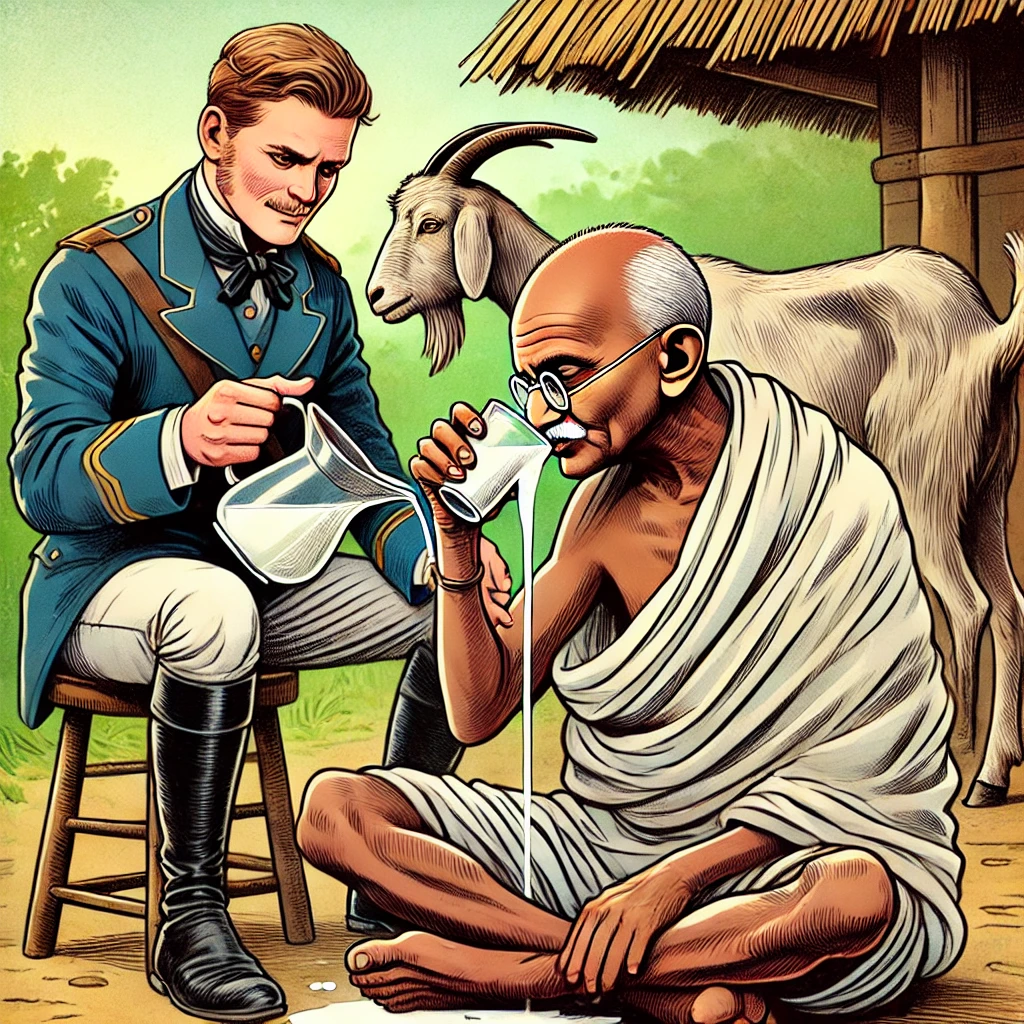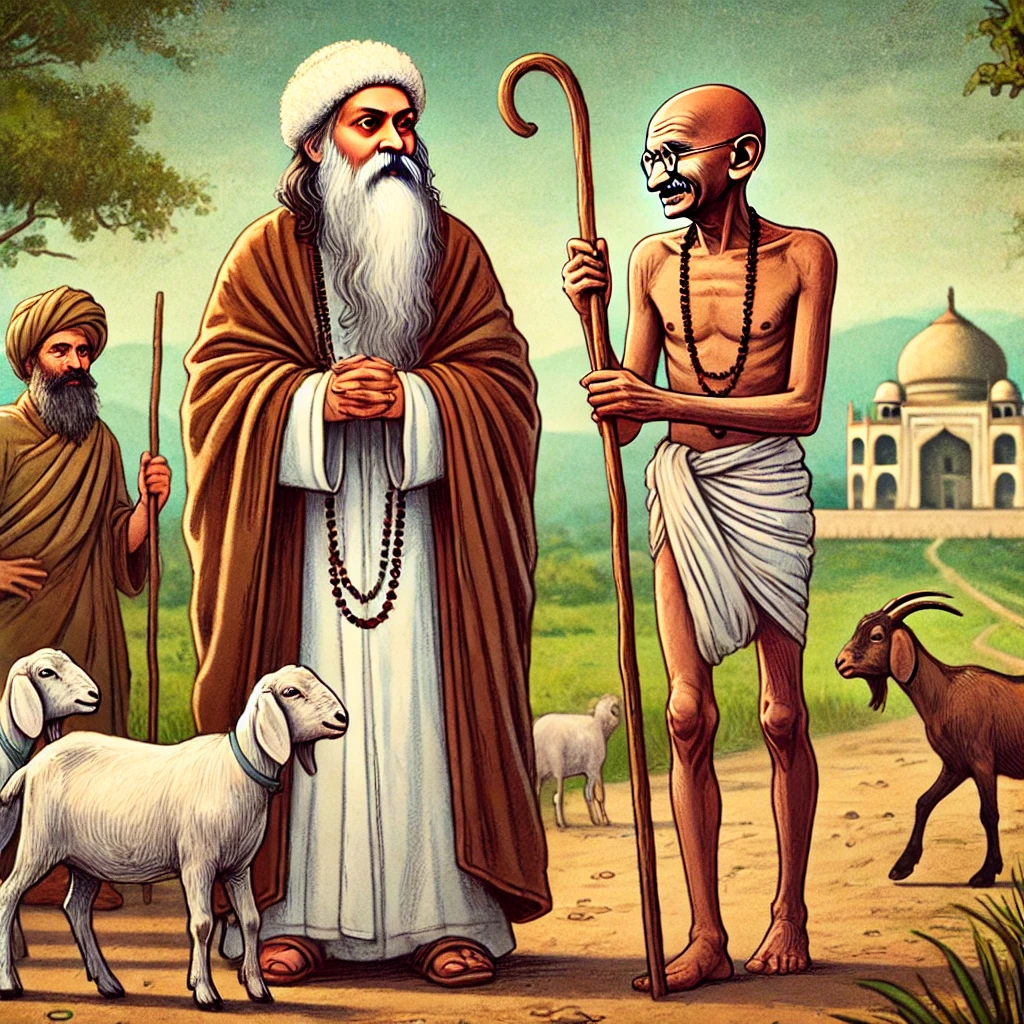Gandhi and His Goats: The Cost of Simplicity

Gandhi and His Goats: The Cost of Simplicity
Mr Gandhi's relationship with his goats and the milk they provided became symbolic of his simple, self-sufficient lifestyle. Gandhi famously drank goat milk after giving up cow’s milk due to his belief in non-violence and a vow he had made to avoid cow products. The goats became an integral part of his daily life, representing his commitment to minimalism, self-sufficiency, and rejection of industrialized foods.
The Hidden Costs of Gandhi’s Simplicity
However, as Osho pointed out with his characteristic sarcasm, Gandhi's "simplicity" came with hidden costs. Keeping Gandhi supplied with goat milk was not as effortless as it seemed. The logistics of maintaining the goats, their caretakers, and the infrastructure to provide for the Mahatma's needs were quite extensive. Gandhi's public image as a humble ascetic belied the elaborate system that supported his lifestyle.
Behind the Scenes of Gandhi's "Poverty"
From caretaking to arranging regular goat milk delivery, the machinery behind Gandhi's "poverty" became ironically expensive. Osho’s critique lies in the contrast between Gandhi’s espoused ideals of self-denial and the often complex arrangements required to maintain those ideals on a daily basis. While Gandhi promoted simplicity, maintaining his pastoral lifestyle—complete with hand-spun clothing and goat milk—turned out to require resources and coordination beyond the image of austerity he projected.
Osho’s Critique of Gandhi

Osho critiqued Mr Gandhi for several reasons, primarily focusing on Gandhi's philosophy of asceticism, his approach to politics, and the contradictions Osho perceived in Gandhi's methods and beliefs. Here are the main points of Osho’s critique:
1. Emphasis on Self-Denial and Suffering
Osho believed that Gandhi’s focus on self-denial and suffering as virtues was misguided. Gandhi promoted a lifestyle of minimalism and self-sacrifice, living simply and encouraging others to do the same. Osho, on the other hand, saw life as something to be embraced fully, including its pleasures. He criticized Gandhi for turning self-denial into a moral virtue, arguing that it encouraged guilt and repression in people rather than joy and celebration of life.
2. Hypocrisy and Political Manipulation
Osho often pointed out what he saw as contradictions between Gandhi’s public image and his political actions. Gandhi was portrayed as a humble, spiritual leader, but Osho suggested that this simplicity was part of a carefully constructed political image. Osho believed that Gandhi’s influence over the masses was not as altruistic as it seemed, but rather a form of manipulation, where the moral high ground was used to control people emotionally and politically.
3. Obsession with Poverty
Osho also criticized Gandhi’s glorification of poverty. Gandhi lived a life of voluntary poverty, but Osho argued that this idealization of poverty was harmful to India, a country already struggling with widespread deprivation. Osho’s philosophy emphasized wealth as a positive force that could improve people's lives and alleviate suffering, whereas Gandhi’s embrace of poverty, according to Osho, romanticized deprivation rather than solving it.
4. Non-Violence (Ahimsa)
Although Osho agreed with the principle of non-violence, he found Gandhi's application of it to be dogmatic and impractical in certain situations. Osho felt that Gandhi’s strict adherence to non-violence sometimes led to passive acceptance of injustice and suffering, without addressing the root causes of violence effectively.
Conclusion
In essence, Osho saw Gandhi as a well-meaning but ultimately misguided leader whose philosophy did not allow for the full exploration of human potential and freedom. He viewed Gandhi’s asceticism and ideals as repressive, holding back both individuals and society from embracing life’s richness and complexities. Osho believed in a more liberating and celebratory approach to life, in contrast to Gandhi’s more austere and disciplined philosophy.
- Gandhi_goats
- Gandhi_goat_milk
- Mahatma_Gandhi_simplicity
- Osho_on_Gandhi
- Gandhi_asceticism_critique
- Gandhi_poverty_lifestyle
- Osho_Gandhi_critique
- Gandhi's_non-violence
- Gandhi_self-denial
- Osho_philosophy
- Gandhi_minimalism
- Osho_on_self-suffering
- Gandhi_hypocrisy
- Gandhi_political_manipulation
- Gandhi_and_non-violence
- Osho_vs_Gandhi
- Gandhi_goat_milk_cost
- Gandhi_pastoral_lifestyle
- Gandhi_hand-spun_clothing
- Gandhi_and_simplicity_paradox
- Political Leaders
- Art & Crafts
- Dance & Music
- Sanatan Dharma
- Education & Training
- Food & Drinks
- Gaming
- Health & Fitness
- Home & Gardening
- Literature & Culture
- Love
- Medicine & Ayurveda
- Motors & Vehicles
- Movies & Cinema
- Parenting
- Politics
- Science & Technology
- Shopping
- Social Media
- Spirituality
- Sports
- War & History
- Yoga & Meditation
- Travel & Tourism
- Natural Disaster
- Business & Startups
- DIY & Home Decor
- Finance
- Personal
- News
- Pet Lovers
- Wild Life & Nature
- Podcast & Audio Books
- Poetry
- Law & Order
- Moral Stories
- Jokes & Humour
- Outro

